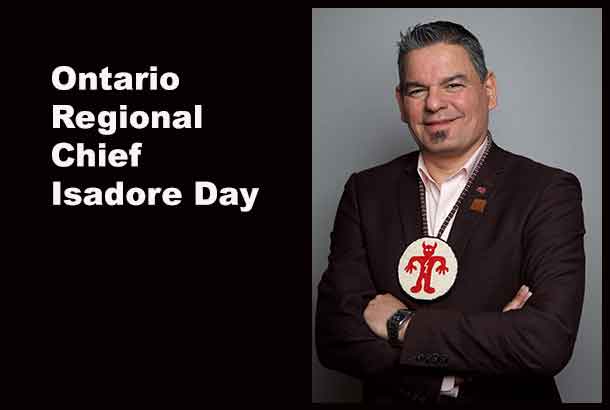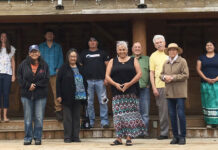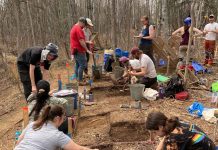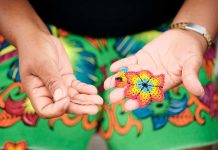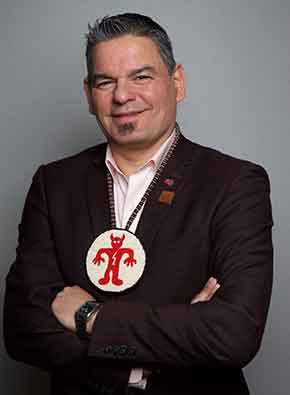 by Isadore Day, Ontario Regional Chief
by Isadore Day, Ontario Regional Chief
Co-Chair of Ontario Natural Resource Forum
Ontario First Nations live almost exclusively on the most vulnerable lands in the far north, while 90 per cent of the province’s population live on just 13 per cent of the land in the south. Our Peoples – from the Great Lakes to James Bay – have been suffering from the affects of global warming and pollution for many years. Our communities have been most affected by floods, fires, contaminated water, and a loss of traditional foods. It’s in all of our interests for this to change for the better.
First Nations signed the Treaties to equally share the lands and resources. This is where our nation-to-nation relationship began – through trade with the newcomers. When the newcomers arrived, we welcomed them with our hand in friendship. If it were not for the riches of our lands and waters, and the natural trade routes, Ontario, and Canada, may never have been established. There may never have been a 150th anniversary of Confederation.
Reconciliation means that we need to eliminate First Nation poverty and despair by working in partnership to ensure the lands and resources are shared for future generations. Last May, Premier Wynne announced the Journey Together commitment, which is aimed at helping to close the poverty gap and remove the colonial barriers that have been in place since the Residential School system. This includes working towards implementation of Resource Revenue Sharing and Benefits– an urgent priority in the coming year, and a major topic at the Ontario Natural Resources Forum, this Wednesday and Thursday in Toronto.
Last year, the province also pledged to include our Peoples in the new carbon economy, as well as provide funding to replace dirty diesel generation with green energy micro-grids. First Nations must also continue to work with the province on major green energy projects that will supply power to all Ontarians. The Climate Change and Green Energy and Economy Acts must be integrated as much as possible.
Our teachings have taught to us to be stewards of the land. And with that, First Nations can be champions when it comes to clean and alternative energy moving forward. There is considerable potential for growth and partnership with First Nations in the development of sustainable energy.
First Nations want to work with both government and the energy industry to advance a sustainable future for Canada by providing our own expertise in our traditional lands. The health of our environment must be balanced against the economic need to ensure the prosperity of our future generations.
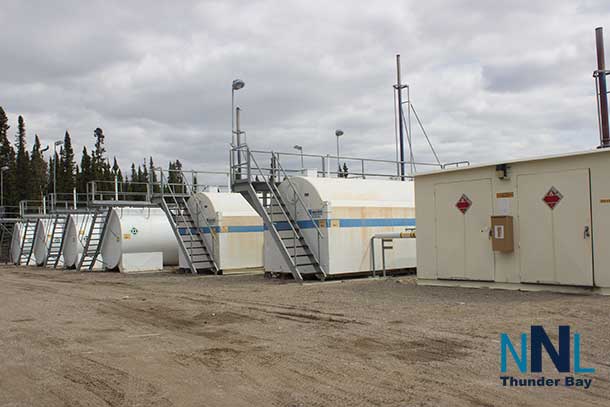
The replacement of diesel generators with green energy micro-grids not only solves the problem of unreliable energy, it also eliminates the risk of diesel spills that contaminate the land and water and reduces the carbon emissions that pollute the air and contributes to climate change. Many First Nation communities in Ontario are involved in renewable development projects that span wind, water, solar and biomass production.
Some examples include:
Moose Cree First Nation has a 25 per cent ownership in Ontario Power Generation’s new $2.5 billion project that will add 440 Megawatts of generation on the Lower Mattagami River. The Chapleau Ojibwe First Nation has signed an interprovincial deal with HydroMega in Quebec to help build and maintain a 20 Megawatt generator on the Kapuskasing River. Henvey Inlet First Nation has signed the largest Indigenous Feed-In-Tariff contract with the Province of Ontario. Once completed, their $1 billion 300 megawatt wind farm will supply energy to 70,000 homes.
These and other success stories present opportunities for First Nations to share best practices and lessons learned on how to gain access to the capital required for renewable development and green energy projects. Local ownership of renewable energy projects offers the opportunity to ensure energy security, energy independence, and energy democracy. This shift can enable our nations to reduce their dependence on southern imports, increasing self-sufficiency, and to give “power” (that is, “electricity”) to the people in our communities, across Ontario, and potentially as part of a North American energy grid..
While we are encouraged by the intentions of the federal and provincial governments to engage and collaborate with Indigenous Peoples in discussions on natural resources and clean technology, we must do more to turn good intentions into concrete actions and investments. With Chiefs, business and government in the same room, the Ontario Natural Resources Forum is one place where this engagement will take place.
Moving forward, any discussion pertaining to resource development or energy needs to be based on full respect for the constitutional, treaty and internationally recognized inherent rights that we have as Indigenous Peoples. The clock is ticking, and we are ready take our place at the table. The time is now to honour the treaties, share the prosperity that built this country. This will be true economic Reconciliation in action.

